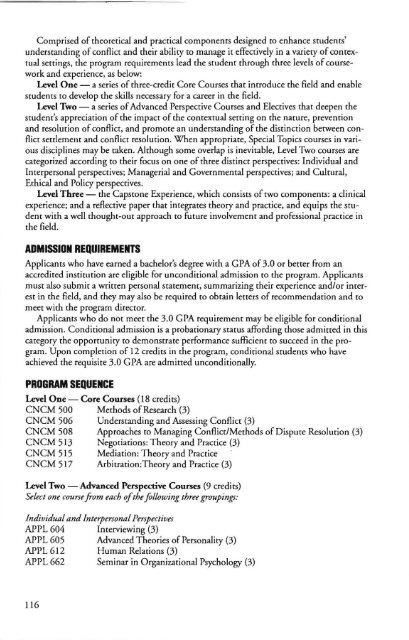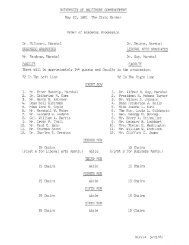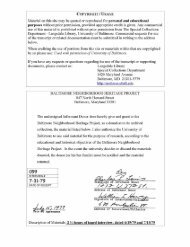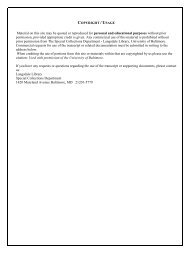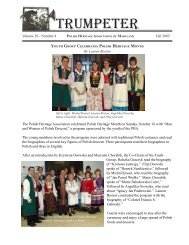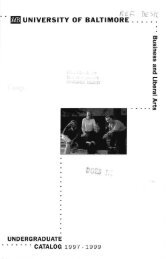2003-2005 - Special Collections - University of Baltimore
2003-2005 - Special Collections - University of Baltimore
2003-2005 - Special Collections - University of Baltimore
Create successful ePaper yourself
Turn your PDF publications into a flip-book with our unique Google optimized e-Paper software.
Comprised <strong>of</strong> theoretical and practical components designed to enhance students'<br />
understanding <strong>of</strong>conflict and their ability to manage it effectively in a variety <strong>of</strong>contextual<br />
settings, the program requirements lead the student through three levels <strong>of</strong> coursework<br />
and experience, as below:<br />
Level One - a series <strong>of</strong> three-credit Core Courses that introduce the field and enable<br />
students to develop the skills necessary for a career in the field.<br />
Level Two - a series <strong>of</strong>Advanced Perspective Courses and Electives that deepen the<br />
student's appreciation <strong>of</strong> the impact <strong>of</strong> the contextual setting on the nature, prevention<br />
and resolution <strong>of</strong> conflict, and promote an understanding <strong>of</strong> the distinction between conflict<br />
settlement and conflict resolution. When appropriate, <strong>Special</strong> Topics courses in various<br />
disciplines may be taken. Although some overlap is inevitable, Level Two courses are<br />
categorized according to their focus on one <strong>of</strong> three distinct perspectives: Individual and<br />
Interpersonal perspectives; Managerial and Governmental perspectives; and Cultural,<br />
Ethical and Policy perspectives.<br />
Level Three - the Capstone Experience, which consists <strong>of</strong> two components: a clinical<br />
experience; and a reflective paper that integrates theory and practice, and equips the student<br />
with a well thought-out approach to future involvement and pr<strong>of</strong>essional practice in<br />
the field.<br />
ADMISSION REQUIREMENTS<br />
Applicants who have earned a bachelor's degree with a GPA <strong>of</strong> 3.0 or better from an<br />
accredited institution are eligible for unconditional admission to the program. Applicants<br />
must also submit a written personal statement, summarizing their experience and/or interest<br />
in the field, and they may also be required to obtain letters <strong>of</strong> recommendation and to<br />
meet with the program director.<br />
Applicants who do not meet the 3.0 GPA requirement may be eligible for conditional<br />
admission. Conditional admission is a probationary statuS affording those admitted in this<br />
category the opportunity to demonstrate performance sufficient to succeed in the program.<br />
Upon completion <strong>of</strong> 12 credits in the program, conditional students who have<br />
achieved the requisite 3.0 GPA are admitted unconditionally.<br />
PROGRAM SEQUENCE<br />
Level One - Core Courses (18 credits)<br />
CNCM 500 Methods <strong>of</strong> Research (3)<br />
CNCM 506 Understanding and Assessing Conflict (3)<br />
CNCM 508 Approaches to Managing Conflict/Methods <strong>of</strong> Dispute Resolution (3)<br />
CNCM 513 Negotiations: Theory and Practice (3)<br />
CNCM 515 Mediation: Theory and Practice<br />
CNCM 517 Arbiuation:Theory and Practice (3)<br />
Level Two - Advanced Perspective Courses (9 credits)<br />
Select one coursefrom each <strong>of</strong>the foLlowing three groupings:<br />
IndividuaL and InterpersonaL Perspectives<br />
APPL 604 Interviewing (3)<br />
APPL 605 Advanced Theories <strong>of</strong> Personality (3)<br />
APPL 612 Human Relations (3)<br />
APPL 662 Seminar in Organizational Psychology (3)<br />
116


